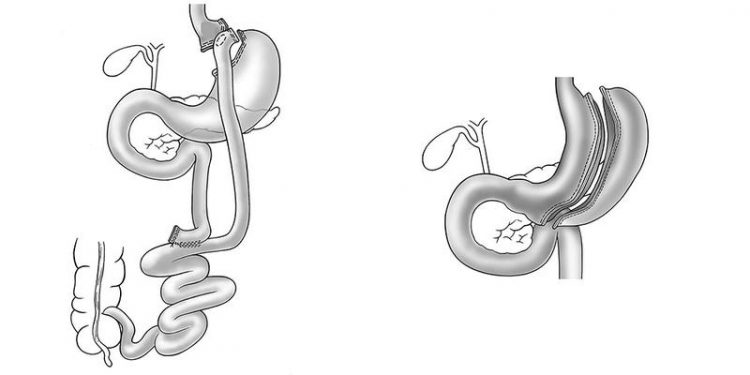Morbid Obesity: Gastric Bypass and Sleeve Gastrectomy Are Comparable

Two types of surgery for severe obesity: In the case of gastric bypass, the stomach is bypassed by a part of the small intestine (left), in the case of the peritoneum, the volume is reduced (right). USZ, Visceral Surgery
Morbid obesity and associated diseases such as diabetes, cardiovascular diseases and cancer are widespread in the western world. Surgical interventions are currently considered to be the most effective measure in severely obese people with a BMI over 35.
The standard surgery is a gastric bypass, where part of the stomach and small intestine is bypassed. Other methods are also becoming more popular, such as sleeve gastrectomy, in which the volume of the stomach is reduced. This operation is technically easier to perform and can be done with low complication rate even in patients with very high BMI.
More than 200 patients examined
To compare these two common types of surgery, the study looked at 217 morbidly obese patients; half were assigned to a gastric bypass and half a sleeve gastrectomy. Their average age was 45.5 years, and 72% of them were women. The study was conducted at four locations in Switzerland and was led by Professor Ralph Peterli from the University of Basel at St. Claraspital.
In terms of weight loss, the two types of surgery led to similar results five years after the surgery: the patients lost 68% of their excess weight after a gastric bypass, and 61% after a sleeve gastrectomy. The BMI also fell from 44 to 32 after both operations. Associated diseases such as hypertension, diabetes, altered blood lipids, back/joint pain and depression were also improved, as well as general quality of life.
Improvement in gastric acid reflux
Patients with existing gastric acid reflux benefited more from a gastric bypass operation: after this procedure, symptoms were eliminated in 60%, compared to only 25% after a sleeve gastrectomy. Sleeve gastrectomy also led to a deterioration or new onset of gastric acid reflux significantly more often. Further surgery or interventions were needed in 22% of gastric bypasses and 16% of sleeve gastrectomy operations.
Original source
Ralph Peterli et al.
Effect of laparoscopic sleeve gastrectomy vs laparoscopic Roux-en-Y gastric bypass on weight loss in patients with morbid obesity: The SM-BOSS randomized clinical trial
JAMA (2018), doi: 10.1001/jama.2017.20897
Further information
Prof. Dr. Ralph Peterli, University of Basel and St. Claraspital Basel, phone: +41 61 685 84 84, email: ralph.peterli@claraspital.ch
https://www.unibas.ch/en/News-Events/News/Uni-Research/Morbid-Obesity.html
Media Contact
More Information:
http://www.unibas.chAll latest news from the category: Health and Medicine
This subject area encompasses research and studies in the field of human medicine.
Among the wide-ranging list of topics covered here are anesthesiology, anatomy, surgery, human genetics, hygiene and environmental medicine, internal medicine, neurology, pharmacology, physiology, urology and dental medicine.
Newest articles

A universal framework for spatial biology
SpatialData is a freely accessible tool to unify and integrate data from different omics technologies accounting for spatial information, which can provide holistic insights into health and disease. Biological processes…

How complex biological processes arise
A $20 million grant from the U.S. National Science Foundation (NSF) will support the establishment and operation of the National Synthesis Center for Emergence in the Molecular and Cellular Sciences (NCEMS) at…

Airborne single-photon lidar system achieves high-resolution 3D imaging
Compact, low-power system opens doors for photon-efficient drone and satellite-based environmental monitoring and mapping. Researchers have developed a compact and lightweight single-photon airborne lidar system that can acquire high-resolution 3D…





















